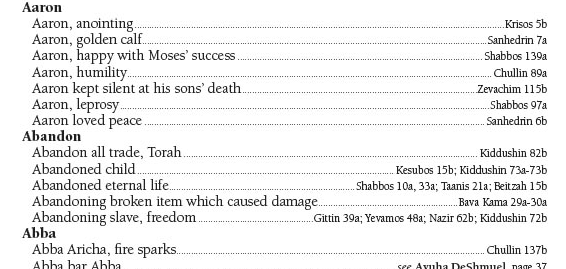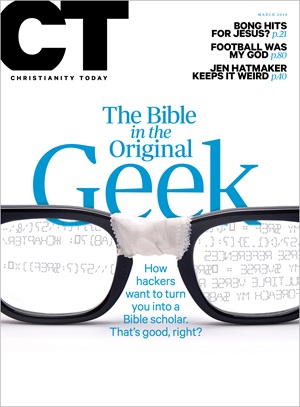The New York Times writes about the first-ever topical index for the Talmud. It looks like a topical Bible and contains 6,600 topics and 27,000 subtopics. (For comparison, Nave’s Topical Bible contains about 5,300 topics and 20,000 subtopics.)

The Sabbath
Two parts of the article stand out. First:
For three decades, Talmud students have been able to use a Nexis-like CD search engine, the Responsa Project, created by Bar Ilan University in Israel…. Bar Ilan officials acknowledged that the CD had one major disadvantage: it cannot be accessed on the Sabbath, when much learning takes place. It also costs $790.
Of course it makes sense that you wouldn’t be able to use a digital study tool on the Sabbath; it had just never occurred to me. The evangelical analog might be having to use a print Bible in church instead of a mobile or projected version.
The Living Index
The second highlight from the article is:
Rabbi Benjamin Blech, professor of Talmud at Yeshiva University, said the rabbis believed that study should not be made too easy. “We want people to struggle with the text because by figuring it out you will have a deeper comprehension,” he said. “They wanted a living index, not a printed index.”
Bible software, websites, and apps are all working to create a “living index” (or at least a “responsive index”) of the Bible that lets you find comprehensive answers to every question that pops into your head while studying the Bible. But will this work devalue the actual experts (pastors and Bible teachers) who currently serve as living indexes?
The book The Lean Startup provides a framework for answering this question. It quotes Farbood Nivi, founder of test-preparation website Grockit:
“Whether you’re studying for the SAT or you’re studying for algebra, you study in one of three ways. You spend some time with experts, you spend some time on your own, and you spend some time with your peers. Grockit offers these three same formats of studying. What we do is we apply technology and algorithms to optimize those three forms.”
Or, in evangelical terms:
| Study Type |
Current Source |
| Time on your own |
Personal Bible study; daily quiet time |
| Time with your peers |
Small group Bible study; Sunday school (not taught by clergy) |
| Time with experts |
Sunday morning sermon; radio and television programs; in-person academic Bible classes |
Bible software has historically augmented “time on your own” by tying together study materials: connecting documents to each other.
Recently, Bible software has expanded into “time with your peers” by mixing in the social layer that is enveloping the wider world of technology—“away from a web that connects documents together to a web that connects people together,” as Paul Adams puts it in his book Grouped. Bible software has three options when embedding social technologies: (1) Inject technology into existing offline practices (e.g., automating the irritating or the expensive); (2) Copy technology from secular sources (e.g., foursquare-style checkins); or (3) Come up with something new. The most likely outcome will involve a combination of these options.
Eventually, Bible software will delve into “time with experts,” as well, whether those experts are your local pastor or nationally recognized figures. Biblical Training is pioneering this approach in the field of Bible studies and theology, while Stanford and MIT are leading the way in other fields.
Will Bible software someday become an “expert” itself, giving you custom answers to your questions and a personal study plan? It’s certainly possible. Khan Academy is already disrupting math education and assessment. Someone will undoubtedly explore whether a similar approach works for Bible studies.
Of course, the open question is just how much we want Bible software to function as a living index; the rabbis who preferred that students “struggle” with text have a point that learning and wisdom come with effort. In a future where Bible software can provide time for you to study on your own, with peers, and with experts, I guess we’ll find out just how “easy” we want Bible study to become.
 This month’s Christianity Today cover story, The Bible in the Original Geek, talks about how programmers are using technology to change how we read, study, and interpret the Bible. If you’re interested in the Bible and technology (and if you’re reading this blog, you probably are), then you should go read it.
This month’s Christianity Today cover story, The Bible in the Original Geek, talks about how programmers are using technology to change how we read, study, and interpret the Bible. If you’re interested in the Bible and technology (and if you’re reading this blog, you probably are), then you should go read it.